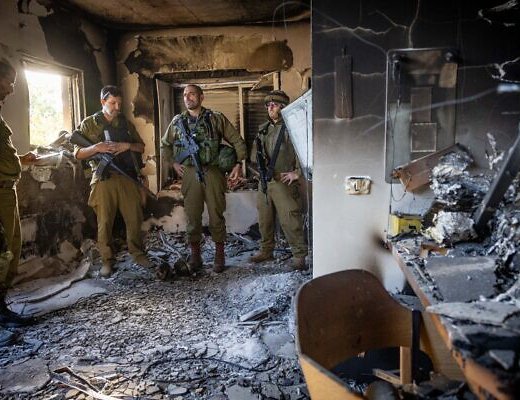
Hamas launched a massive barrage of rockets toward central and southern Israel on Wednesday evening, lightly wounding six people, following several days with fewer missiles fired from Gaza.
Israel continued to strike targets in the Gaza Strip throughout the day, as officials said they are still gearing up for an upcoming ground invasion, without providing a timeline.
Air raid sirens wailed around 9:30 p.m. in Rishon Lezion, Petah Tikva, Bat Yam, Rosh Ha’ayin and many surrounding towns, as well as in Ashdod shortly afterward.
A rocket crashed into a home in Rishon Lezion, lightly wounding three people — a woman in her 40s hurt by shards of glass, a man around 80 wounded by shrapnel and a woman, 75, being treated for smoke inhalation, according to the Magen David Adom ambulance service.
Significant damage was caused to the home hit by the rocket.
In Kfar Sirkin, a town near Petah Tikva, a 13-year-old boy was lightly hurt after suffering blast injuries following a nearby rocket impact, and a woman in her 20s and a 14-year-old girl were hurt while running for shelter.
In northern Israel, the military said air defense systems intercepted a surface-to-air missile launched from Lebanon at an Israeli military drone on Wednesday night, amid continued exchanges with the Iran-backed Hezbollah terror group and allied Palestinian factions.
The UAV was apparently not damaged in the attempt.
Another aircraft struck the source of the missile fire in southern Lebanon, the IDF added, after announcing further strikes on Hezbollah posts following additional rocket attacks from southern Lebanon earlier in the day.
Also on Wednesday evening, IDF Spokesman Rear Adm. Daniel Hagari said the military was continuing to carry out airstrikes in the Gaza Strip to “improve” the army’s situation for the upcoming ground offensive.
“Today we struck in Gaza City terror infrastructure in buildings and underground,” Hagari said. “We will continue to strike in Gaza to achieve the goals of the war. Every strike improves our situation for the next stages.”
He said the war “will be long, and to achieve the goals of the war, resilience, trust and patience are required” from the public.
In his own comments Wednesday evening, Prime Minister Benjamin Netanyahu said that Israel is “preparing for a ground incursion. I won’t specify when, how, how many… this is the way, so that we protect our soldiers’ lives.”
Netanyahu said the members of the narrow war cabinet and the IDF chief of staff had agreed “unanimously” on the timing of the ground incursion, appearing to push back on reports of disagreement among the highest echelons, as well as of US pressure to delay the move.
The prime minister said the huge pain of the loss of 1,400 people — mostly civilians — in Hamas’s murderous onslaught is not forgotten, and promised to establish days of mourning in memory of those killed in the assault.
Meanwhile, Minister Benny Gantz reportedly told a group of evacuees from a community near the Gaza border that they were unlikely to return to their homes in the coming year.
According to Channel 12 news, Gantz — who joined the government and the war cabinet earlier this month — told residents of Zikim and Netiv Ha’asara that they should be prepared to remain in hotels paid for by the state for another three months before eventually being transferred to alternative housing.
About 200,000 people in Israel are thought to have been displaced due to the war, including those in southern towns near Gaza and in areas close to the Lebanon border, where Hezbollah has been firing missiles over the past two weeks.
In public comments, Gantz has vowed that the southern communities destroyed in Hamas’s deadly onslaught will be fully rebuilt, and even vowed to relocate there himself in the future.
Meanwhile, the World Health Organization on Wednesday called for Hamas to provide proof of life of the estimated 222 hostages it is holding and release them all on health grounds.
The WHO said the International Committee of the Red Cross should be allowed immediate medical access to ascertain their health status, while it stands ready to provide any health support required.
“There is an urgent need for the captors of the hostages to provide signs of life, proof of provision of health care and the immediate release, on humanitarian and health grounds, of all those abducted,” WHO chief Tedros Adhanom Ghebreyesus said in a statement.
“Many of the hostages, including children, women and the elderly, have pre-existing health conditions requiring urgent and sustained care and treatment. The mental health trauma that the abducted, and the families, are facing is acute and psychosocial support is of great importance.”
The Hamas-run health ministry claimed on Wednesday that at least 6,546 Palestinians have been killed and 17,439 others wounded. These claims could not be independently verified, and are said to include the purported inflated death toll from the al-Ahli hospital blast — attributed to a failed rocket launch — as well as potentially thousands of Hamas terrorist operatives.
Earlier Wednesday, Hamas boasted that it launched a long-range rocket from the Gaza Strip at Israel’s southernmost city of Eilat. The rocket did not set off sirens in Eilat or any other towns in the south, and the IDF later said that the projectile landed in an open area, causing no injuries or damage.
Earlier, the terror group also claimed to fire a long-range R160 missile toward the Haifa area, setting off sirens in the northern towns of Daliyat al-Karmel and Kerem Maharal. The IDF said the projectile exploded in mid-air.
Israel has made clear it intends to continue its military campaign against Hamas until the terror group is eliminated from Gaza. It has not explicitly ruled out the potential for a humanitarian pause.
- PM Oli Returns Home Attending UN FFD4 Summit
- Jul 05, 2025
- Trump signs into law domestic policy bill
- Jul 05, 2025
- Putin-Trump call after US halts some arms shipments to Ukraine
- Jul 04, 2025
- USAID programs officially suspended
- Jul 03, 2025
- Thailand’s Constitutional Court suspended PM Paetongtarn Shinawatra
- Jul 02, 2025















